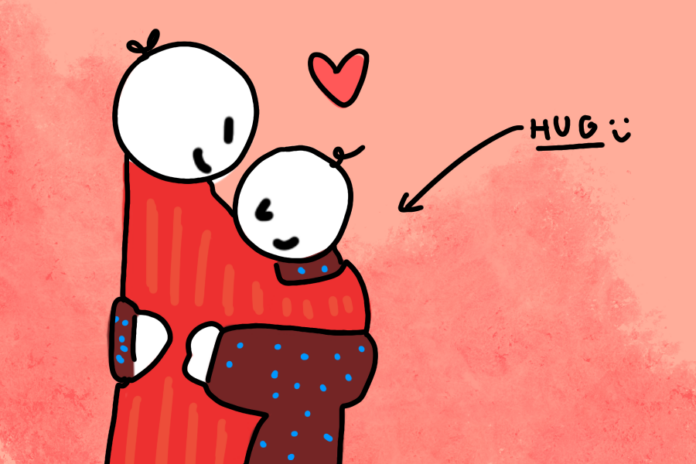Exploring the emotional and physical benefits of giving and receiving hugs
By MAYA KORNYEYEVA — mkornyeyeva@ucdavis.edu
Hugs are my absolute favorite thing in the world. There’s a number of reasons why I love them: they’re comfy, soft, stress-reducing and generally pleasant. Whenever I give or receive a hug, it truly feels as though the world melts away, and it’s just myself and the other person sharing an overwhelmingly positive emotional connection.
I know what you’re thinking: “Yes, this is fairly obvious, hugs are great.” But is there a scientific reason for this plethora of fuzzy sensations we receive from hugs? Something more than just “a happy feeling?”
Unsurprisingly, the joint actions of giving and receiving hugs are deeply rooted in our body’s biological signals and result in numerous benefits for our physical and emotional well-being. When looking at the dimension of mental health, hugs are similar to a hot cup of tea, a good book and a fuzzy blanket; they work well to reduce stress, allowing not just our body to relax but also our mind, encouraging us to take a few seconds to pause and breathe.
Our sense of touch is one of the most important yet often overlooked senses, and consists of two types — “fast-touch” and “slow-touch.” “Fast-touch” is responsible for quickly detecting what comes in contact with our skin, such as the hot surface of a pan or rain falling on our face. “Slow-touch” is much more subtle and activates a nerve system called c-tactile afferents. This web of nerves is responsible for processing the emotional meaning of touch. Hugs, which can last anywhere from a few seconds to minutes, are a “slow-touch” sense, affecting the c-tactile afferents and sending numerous hormones throughout your body — the most prominent being oxytocin and endorphins.
Oxytocin, also known as the “love” hormone, plays a pivotal role in social connection. The release of oxytocin is responsible for lowering blood pressure and heart rate levels, thereby reducing anxiety and stress levels. Endorphins, on the other hand, are neurotransmitters that travel through the reward pathways of your brain to create the feeling of immediate gratification and happiness often associated with a hug. They are typically released when you are participating in an activity that you enjoy, which can be anything from exercising, cooking, doing a hobby or even eating a delicious meal. Like oxytocin, endorphins reduce stress, improve your mood and promote a sense of well-being.
That being said, hugs are also beneficial to our health in the long term. Studies demonstrate that the stress-reducing nature of hugs can help improve sleep, allowing the body to regulate your sleep-cycle better. Over time, hugs and social connection also reduce feelings of isolation and loneliness, building up your resilience to stress. In other words, the more secure you feel from hugs and regular “slow-touch” experiences, the less prone you will be to the negative effects that result from feeling stressed: your body is mobilized to bounce back stronger and more rapidly.
Of course, consent is the key ingredient to hugs, and, for that matter, any other physical contact with another person (even if it’s just a fist bump or high five). Asking first gives your partner, friend or family member a choice — a chance to agree or otherwise deny your offer. In this sense, the positive health benefits that a person receives from a hug are negated without the crucial factor of consent, so always, always keep that in mind before engaging in a hug.
Thus, even though a hug may seem simple or inconsequential, it is actually incredibly important in reducing stress and improving mental and physical health. Hugs stimulate a wide range of positive emotions, which we often don’t experience on a daily basis. For me, one long hug is enough to lift an invisible weight from my shoulders — perhaps one that I didn’t even notice was there.
Hugs are such an intrinsic part of human interaction. In our busy lives, we often self-sacrifice our own needs in favor of checking all the boxes on our “to-do” list. So, if you notice someone looking particularly down, give them a hug: they might really need it.
Written by: Maya Kornyeyeva — mkornyeyeva@ucdavis.edu
Disclaimer: The views and opinions expressed by individual columnists belong to the columnists alone and do not necessarily indicate the views and opinions held by The California Aggie.









